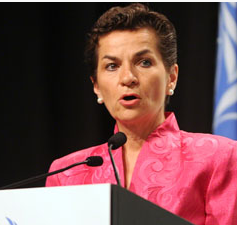Christiana Figueres, UNFCCC Executive Secretary, delivered a lecture on the theme "Implications of the Durban outcome for enhancing action on climate change on the ground towards a more sustainable future." She called on representatives of government, business and civil society to take "the unambiguous low-carbon policy signals from Durban" and increase action through new partnerships.
 9 March 2012: Christiana Figueres, UNFCCC Executive Secretary, delivered a lecture on the theme “Implications of the Durban outcome for enhancing action on climate change on the ground towards a more sustainable future,” at an event organized by the International Institute for Environment and Development (IIED) in London, UK.
9 March 2012: Christiana Figueres, UNFCCC Executive Secretary, delivered a lecture on the theme “Implications of the Durban outcome for enhancing action on climate change on the ground towards a more sustainable future,” at an event organized by the International Institute for Environment and Development (IIED) in London, UK.
In her “Barbara Ward lecture,” Figueres underscored the urgent need for sustainability transformation, noting that “a critical component of that is the energy revolution that needs to both address emissions and power the world’s move into a sustainable future.” She underlined the growing momentum for both a sustainability and an energy revolution, as illustrated by emerging policies and growing investment trends.
On the results of the 17th session of the Conference of the Parties (COP 17) to the UNFCCC, which took place in Durban, South Africa, at the end of 2011, Figueres noted that despite mixed media reporting, the Conference was “the most encompassing and furthest reaching conference in the history of the climate change negotiations.” She stressed that the Conference showed a tangible universal political will to act on climate change and delivered a “loud message for the world: the future is unmistakably low-carbon!” She concluded by calling on representatives of government, business and civil society to take “the unambiguous low-carbon policy signals from Durban” and increase action through new partnerships. [UNFCCC Executive Secretary’s Lecture]